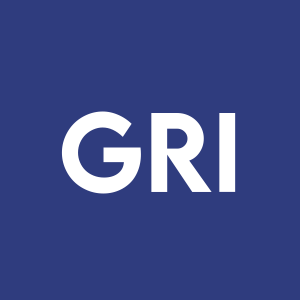GRI Bio Announces European Patent Office Issued a Decision to Grant Notice for Patent Covering GRI-0803 and Its Library of 500+ Proprietary Compounds
Rhea-AI Summary
GRI Bio (NASDAQ: GRI) announced that the European Patent Office will issue a patent on January 16, 2025, covering GRI-0803 and its library of 500+ proprietary compounds. The patent, titled 'Oxygenated Amino- or Ammonium-Containing Sulfonic Acid, Phosphonic Acid and Carboxylic Acid Derivatives and Their Medical Use,' includes coverage of GRI-0803, a novel activator of human type 2 NKT cells being developed for autoimmune disorders, particularly systemic lupus erythematosus (SLE).
The company's preclinical studies showed that type 2 NKT activating molecules inhibited both murine and human iNKT cells, with oral administration inhibiting lupus nephritis and improving survival. While GRI Bio is currently focusing on GRI-0621, which is in Phase 2a trials for IPF with interim data expected in Q1 2025, the GRI-0803 program will continue in 2025 pending additional funding.
Positive
- Secured new European patent protection for GRI-0803 and 500+ compounds
- Preclinical studies showed positive results in lupus nephritis treatment
- Phase 2a trial for GRI-0621 progressing with results expected Q1-Q2 2025
Negative
- GRI-0803 program advancement dependent on additional funding
- Resources currently to focus primarily on GRI-0621
News Market Reaction – GRI
On the day this news was published, GRI gained 1.86%, reflecting a mild positive market reaction.
Data tracked by StockTitan Argus on the day of publication.
– Company committed to building a robust global patent estate across its innovative pipeline of NKT cell modulators
LA JOLLA, CA, Dec. 23, 2024 (GLOBE NEWSWIRE) -- GRI Bio, Inc. (NASDAQ: GRI) (“GRI Bio” or the “Company”), a biotechnology company advancing an innovative pipeline of Natural Killer T (“NKT”) cell modulators for the treatment of inflammatory, fibrotic and autoimmune diseases, today announced that European Patent Office (EPO) has issued a decision to grant notice for patent application number 19,166,502 titled, “Oxygenated Amino- or Ammonium-Containing Sulfonic Acid, Phosphonic Acid and Carboxylic Acid Derivatives and Their Medical Use.” Based on the intention to grant notice, the Company expects the EPO to issue a patent January 16, 2025.
“We have continued to make encouraging progress in our initiative to bolster our global patent estate covering our innovative pipeline of NKT cell modulators and library of over 500 proprietary compounds. We are pleased to add this anticipated European patent to our intellectual property portfolio. We continue to believe in our highly differentiated approach to the prevention and treatment of inflammatory, fibrotic and autoimmune diseases and look forward to further advancing their development to ultimately address areas of significant unmet medical need,” Marc Hertz, PhD, Chief Executive Officer of GRI Bio.
The patent claims include coverage of GRI-0803, the Company’s novel activator of human type 2 NKT cells in development for the treatment of autoimmune disorders, with an initial focus on systemic lupus erythematosus (SLE). Activation of type 2 NKT leads to a dendritic cell-mediated inhibition of iNKT cells. In the Company’s preclinical studies, type 2 NKT activating molecules, GRI-0803 and GRI-0124, were observed to inhibit both murine and human iNKT cells. Oral administration of these type 2 NKT activating molecules was observed to inhibit lupus nephritis and to significantly improve overall survival. The Company is currently focusing its available resources on GRI-0621, but, pending additional funding, the GRI-0803 IND-enabling and Phase1 program will continue in 2025.
The Company is currently advancing the development of its lead program, GRI-0621, in a Phase 2a, randomized, double-blind, multi-center, placebo-controlled, parallel-design, 2-arm study for the treatment of IPF. Interim data from the Phase 2a biomarker study is expected in the first quarter of 2025 and topline results are expected in the second quarter of 2025. For more information about the Phase 2a study, please visit clinicaltrials.gov and reference identifier NCT06331624.
About GRI Bio, Inc.
GRI Bio is a clinical-stage biopharmaceutical company focused on fundamentally changing the way inflammatory, fibrotic and autoimmune diseases are treated. GRI Bio’s therapies are designed to target the activity of NKT cells, which are key regulators earlier in the inflammatory cascade, to interrupt disease progression and restore the immune system to homeostasis. NKT cells are innate-like T cells that share properties of both NK and T cells and are a functional link between the innate and adaptive immune responses. Type 1 invariant (iNKT) cells play a critical role in propagating the injury, inflammatory response, and fibrosis observed in inflammatory and fibrotic indications. GRI Bio’s lead program, GRI-0621, is an inhibitor of iNKT cell activity and is being developed as a novel oral therapeutic for the treatment of idiopathic pulmonary fibrosis, a serious disease with significant unmet need. The Company is also developing a pipeline of novel type 2 NKT agonists for the treatment of systemic lupus erythematosus. Additionally, with a library of over 500 proprietary compounds, GRI Bio has the ability to fuel a growing pipeline.
Forward-Looking Statements
This press release contains “forward-looking statements” within the meaning of the “safe harbor” provisions of the Private Securities Litigation Reform Act of 1995. Forward-looking statements may be identified by the use of words such as “anticipate,” “believe,” “contemplate,” “could,” “estimate,” “expect,” “intend,” “seek,” “may,” “might,” “plan,” “potential,” “predict,” “project,” “target,” “aim,” “should,” “will,” “would,” or the negative of these words or other similar expressions. These forward-looking statements are based on the Company’s current beliefs and expectations. Forward-looking statements include, but are not limited to, statements regarding: the Company’s expectations with respect to development and commercialization of the Company’s product candidates, the timing of initiation or completion of clinical trials and availability of resulting data, the potential benefits and impact of the Company’s clinical trials and product candidates and any implication that the data or results observed in preclinical trials or earlier studies or trials will be indicative of results of later studies or clinical trials, the Company’s beliefs and expectations regarding potential shareholder value and future financial performance, the Company’s beliefs about the timing and outcome of regulatory approvals and potential regulatory approval pathways, the Company’s expected milestones for the first half of 2025, and the Company’s beliefs and expectations regarding the sufficiency of its existing cash and cash equivalents to fund its planned operations, its ability to raise additional funds, which may not be available to the Company on acceptable terms or at all, and capital expenditure requirements. Actual results may differ from the forward-looking statements expressed by the Company in this press release and consequently, you should not rely on these forward-looking statements as predictions of future events. These forward-looking statements are subject to inherent uncertainties, risks and assumptions that are difficult to predict, including, without limitation: (1) the inability to maintain the listing of the Company’s common stock on Nasdaq and to comply with applicable listing requirements; (2) changes in applicable laws or regulations; (3) the inability of the Company to raise financing in the future; (4) the success, cost and timing of the Company’s product development activities; (5) the inability of the Company to obtain and maintain regulatory clearance or approval for its respective products, and any related restrictions and limitations of any cleared or approved product; (6) the inability of the Company to identify, in-license or acquire additional technology; (7) the inability of the Company to compete with other companies currently marketing or engaged in the development of products and services that the Company is currently developing; (8) the size and growth potential of the markets for the Company’s products and services, and their respective ability to serve those markets, either alone or in partnership with others; (9) the failure to achieve any milestones or receive any milestone payments under any agreements; (10) inaccuracy in the Company’s estimates regarding expenses, future revenue, capital requirements and needs for and the ability to obtain additional financing; (11) the Company’s ability to protect and enforce its intellectual property portfolio, including any newly issued patents; and (12) other risks and uncertainties indicated from time to time in the Company’s filings with the U.S. Securities and Exchange Commission (the “SEC”), including the risks and uncertainties described in the “Risk Factors” section of the Company’s most recent Annual Report on Form 10-K filed with the SEC on March 28, 2024 and subsequently filed reports. Forward-looking statements contained in this announcement are made as of this date, and the Company undertakes no duty to update such information except as required under applicable law.
Investor Contact:
JTC Team, LLC
Jenene Thomas
(908) 824-0775
GRI@jtcir.com








